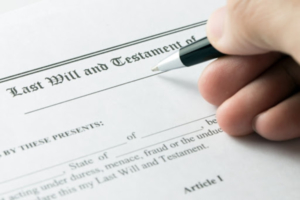
Making a will is an important part of the estate planning process. Unfortunately, however, many people don’t start thinking about creating their will until it is too late.
Don’t get caught without a will in place if you can help it. At Beller Law, P.L., we have an entire practice area dedicated to estate planning. When you hire our team, you can rest assured knowing that your estate plan will be in good hands and crafted with care.
Not sure quite yet whether you’re ready to move forward? That’s okay! Keep reading to learn about the 5 things to know before making your will. When you are ready, our team of estate planning legal matters attorney will be standing by and ready to help you create an estate plan that meets your needs.
1. What Is a Will?
Before taking any next steps, it is important to have a basic understanding of what a will is. So, what exactly is a will?
A will, sometimes called a last will and testament, is a legal document. It clearly describes your wishes regarding how you want your property distributed after your death along with other important decisions. Common items in a will include:
- Designation of beneficiaries who you wish to inherit your assets;
- Instructions for how and in what proportion you intend for your beneficiaries to receive your assets after your death;
- Designation of an executor, sometimes called a personal representative, who will be tasked with managing your estate and carrying out the provisions of your will after your death; and
- Designation of guardians for any minor children.
The precise contents of a last will and testament will vary from person to person. But one thing is almost always true—having a last will and testament can provide you and your loved ones with clarity and peace of mind regarding your wishes for after you pass.
2. Do I Need a Last Will and Testament?
In short, no. You do not necessarily need a last will and testament. However, having one in place before you pass away is strongly recommended.
While it’s true that many people die without a will or other type of estate plan in place, this does not mean that this is what’s best. In fact, dying without any type of estate plan can lead to a great deal of stress and uncertainty for your loved ones as they try to navigate the aftermath of your passing. So, although making a will is not a legal requirement, doing so is a fantastic way to plan for the future and take care of those you leave behind.
3. What Happens if I Die Without a Will?
One of the most important things to know before making a will is what happens if you die without one. Dying without a will does come with some consequences. When someone passes away without having made any will or estate plan, this is referred to as dying “intestate.” If you die without a will in Florida, your estate will be subject to Florida’s intestate succession statutes.
Thus, you will have essentially no say in the distribution of your assets or other post-death decisions. Rather, all of your assets will be distributed in the specific order generically provided for by Florida law.
Generally, Florida intestate succession law provides that your assets will pass to your next of kin. This may be sufficient for some people. However, in many situations, people have more specific or complicated wishes that would not be possible under intestate succession. For example, you might want to leave a portion of your assets to:
- A close friend;
- An number of extended family members; or
- A charitable organization.
Under intestate succession, these options are never guaranteed. Thus, the best way to ensure that your assets pass to your desired beneficiaries is to create a will or other estate planning document that clearly delineates your wishes.
4. Is a Will the Only Estate Planning Document Available?
Absolutely not. In fact, there are many other types of estate planning documents that you may consider creating in place or in conjunction with a last will and testament. Examples of other common types of estate planning documents include:
- Trusts,
- Pour-over wills,
- Powers of attorney,
- Medical directives, and
- Health care appointments.
If you have questions about any of these estate planning documents, do not hesitate to reach out to our team. We pride ourselves on helping our clients determine the best course of action when it comes to creating an estate plan to fit their particular needs.
5. When Should I Start Thinking About Making a Will?
Many people believe that creating a will is something that you do not need to do until later in life. However, this is one of the most common estate planning myths out there. The simple fact is that it is never too early to start thinking about your estate plan.
Nothing in life is certain, including life itself. You simply never know what life will bring. Thus, the best thing you can do is prepare for the unexpected. So don’t put off making your will. Get started today by contacting the estate planning legal matters lawyer at Beller Law, P.L.
Need Help Making a Will?
Of course, these aren’t the only things to know before making your will. If you want to learn more about making a will and get any other estate planning questions you have answered—we want to help. The lawyer at Beller Law, P.L., have more than 40 years of experience helping clients with their estate planning needs. When you hire our team, you can rest assured knowing that you will be in great hands. Contact us today to discuss your case and see how we can help you.
